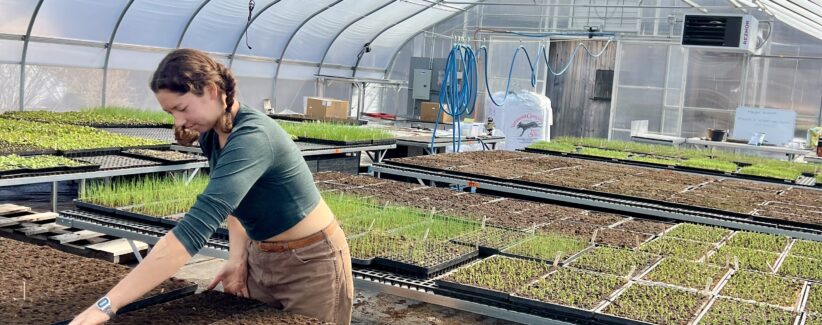Read for Seeds Celebrates Record-Setting Year

Everyone can make a difference, regardless of age and stage. Read for Seeds is proof positive. Local elementary elementary and middle school students partner with Gaining Ground for a lesson in learning, literacy and the idea that change—no matter how small—adds up.
“Read for Seeds began as a way to connect local school children with agriculture, the food system, and philanthropy while helping to spread the word about Gaining Ground’s hunger relief work,” says Allison Goodwin, Gaining Ground’s operations director.
Read for Seeds started in 2004. Each year, Gaining Ground reaches out to schools in early November to gauge interest. Then farmers visit classrooms, and explain Gaining Ground’s mission and how Read for Seeds works: Read as much as possible (usually for two to three weeks) and gather donations.
“The kids love to hear directly from the farmers and enjoy seeing them again months later when they visit Gaining Ground,” Allison says.
Allison says kids usually get family and friends to donate a few cents per page or hour read. Those funds go toward seeds that Gaining Ground uses to grow vegetables—those seemingly small pledges add up. The proceeds from Read for Seeds have grown like beanstalks—in a good way—and Gaining Ground has reaped the benefits.
“The program raised $3,600 toward the farm’s seed budget in its first year,” Allison says. “This year, students raised over $19,600 for Gaining Ground, which is an all-time record. Depending on the year, Read for Seeds covers anywhere from 30 to 70% of the farm’s seed budget, which is amazing. Organic seeds are costly, and this program helps Gaining Ground immensely.”
Nancy Fell, a second-grade teacher at Belmont Day School, has witnessed the benefits of Read for Seeds as a mother and an educator. Fell’s children participated with Thoreau School. She began participating with her class at Belmont Day School in 2007 and calls it a foundational experience for students. Nancy is stumped when asked to pick her favorite part of the program.
“The enthusiasm is palpable—from tracking the number of pages read to sharing book recommendations to our day-long read-a-thon, complete with blankets, pillows, slippers and stuffed animals,” Nancy says. “Many adult members of our community join us and read alongside the second graders, supporting and encouraging them along the way.”
Students get to see the fruits of their labor at the farm later in the spring, which Nancy raves is another highlight.
“The staff are always welcoming and patient, and the students come home, sharing their experiences with friends and family—hopefully laying the groundwork or planting the seed for next year’s Read for Seeds.” Nancy shares with a smile.
The feeling is mutual. Allison says the Gaining Ground team also looks forward to the annual visits.
“It wouldn’t be spring at Gaining Ground without crowds of students excitedly bursting forth from yellow school buses, running into the fields, getting dirty, and joyfully encountering the vegetables they helped us to grow,” Allison says.
The visit connects children with their community and ties together various aspects of Fell’s second-grade curriculum, including work in the Belmond Day School garden.
“In the fall, the students engage in their first research project, researching environmental changemakers,” Nancy shares. “We define a changemaker as someone who identifies a problem, works to find a solution, and inspires other people to help. The students then begin to see themselves as changemakers as we embark on Read for Seeds in the spring.”
The program also complements the unit in which students map food labels to better understand where their food comes from, how transportation impacts the environment, and how to achieve nutritious and equitable access to fresh food.
“The students begin to see themselves as part of a much bigger interconnected world and begin to understand and appreciate the responsibilities that come with being a citizen of the world,” Nancy says.
Allison hopes to offer these benefits to more schoolchildren as the program keeps growing. “With director of agriculture and volunteer experience Mark Congdon at the helm, the Read for Seeds program is sure to expand and continue to grow going forward,” Allison says. “Mark has a wealth of experience helping people, young and old, to share in the joy that comes from engaging with the soil and getting involved in growing food. We would love to welcome more schools in 2026 and beyond and are always looking to welcome more enthusiastic young readers into the program.”